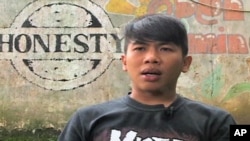Because drug users often engage in dangerous behaviors like sharing dirty needles, they are at more risk of becoming infected with HIV, the virus that causes AIDS. Many of those infected struggle to cope with not only addiction and HIV treatment, but also with the social stigma associated with AIDS. VOA profiles Indonesian activist Ginan Koesmayadi, who takes a different approach to rehabilitation, using soccer to help HIV-infected addicts stay clean and show the world they can lead normal lives in this installment of Making a Difference.
Ginan Koesmayadi started a soccer team of HIV-infected drug users to take their minds off their addiction. Soon he realized the game might be the key to both their recovery and acceptance in the community. "It can increase an HIV-positive person's confidence. It can show to society that we can do what common people do, so that marginalization against HIV positive people in society can be reduced through football," he said.
Koesmayadi is himself an HIV-positive former drug user. He is co-founder of Rumah Cemara, a drug rehabilitation center in the Indonesian city of Bandung. Most of the staff are ex-drug users. Koesmayadi says their experience helps them better relate to and more effectively counsel those fighting addiction.
While most of the center's programs show addicts the road to recovery, team member Richie Erlangga says football motivates them to want to change. "Football is giving a more mental effect. If I don't play football I feel lazy, but if I play I feel spirit. It is not influencing me physically, but it is more psychological," he said.
Last year Rumah Cemara's football team won the annual championship sponsored by Indonesia's National Narcotics Board. And in September it will represent Indonesia in Brazil in the World Homeless cup.
Koesmayadi says football helps the community see the players for what they can achieve and helps players take charge of their lives. "Problems don't make us terrified and down. (It's more that problems make us think.) Difficulties are intended to make us better, not bitter," he stated.
Koesmayadi says he is lucky to have such a close family at Rumah Cemara, and he will keep its doors open to those in need.




